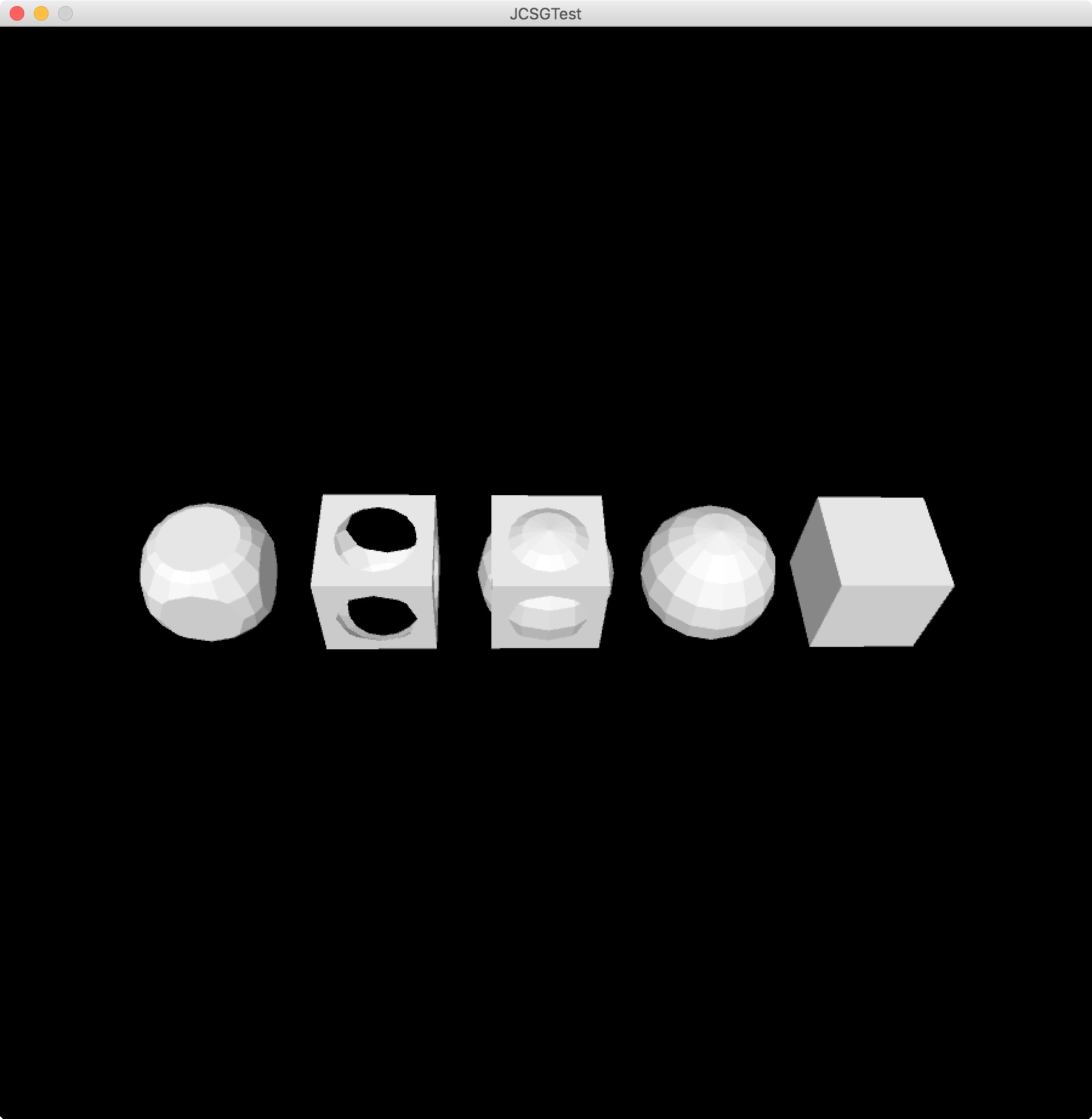是否可以在处理过程中使用jcsg库?
Processing是一个创造性的编码平台--语言、IDE和生态系统--由处理社区在Processing https://processing.org的支持下维护。处理Java模式通常可以从Java库中的代码中获益。
JCSG是基于BSP的构造实体几何( https://github.com/miho/JCSG )的Java实现。
回答 1
Stack Overflow用户
发布于 2019-07-12 06:48:13
从单独的处理中可以跳过的循环很少,但是是的,您可以在处理过程中使用任何Java库。(只需将库.jar拖到保存的草图上即可)
首先,您需要编译JCSG .jar库和VVecMath .jar库来运行示例代码。
要做到这一点,您需要Gradle。如果您使用过Android / Android / IntelliJ /等等,您可以从头开始安装它,也可以使用系统中的现有安装。
正如自述文件所提到的,在OSX/Linux/等上从每个库文件夹运行:
bash gradlew assemble在Windows上运行:
gradlew assemble在我的例子中,我使用了Android附带的Gradle安装,我在我的mac上安装了它:
bash /Applications/IDEsAndEditors/Android\ Studio.app/Contents/plugins/android/lib/templates/gradle/wrapper/gradlew assemble一旦编译了.jar文件,就可以简单地将它们放到保存的处理草图中。这将创建一个code文件夹。在这个阶段,您可以使用草图中的库。
(提示:转到Processing > Preferences,并使用Ctrl+Space启用代码完成功能,以便更容易地查看可用的方法和属性(IDE,如eclipse/IntelliJ/NetBeans/等)
我做了一个快速测试,但是JCSG保存的OBJ文件不能被处理的内置PShape OBJ加载程序解析。
import java.nio.file.Paths;
PShape csgResult;
void setup(){
size(900,900,P3D);
// we use cube and sphere as base geometries
CSG cube = new Cube(2).toCSG();
CSG sphere = new Sphere(1.25).toCSG();
// perform union, difference and intersection
CSG cubePlusSphere = cube.union(sphere);
CSG cubeMinusSphere = cube.difference(sphere);
CSG cubeIntersectSphere = cube.intersect(sphere);
// translate geometries to prevent overlapping
CSG union = cube.
union(sphere.transformed(Transform.unity().translateX(3))).
union(cubePlusSphere.transformed(Transform.unity().translateX(6))).
union(cubeMinusSphere.transformed(Transform.unity().translateX(9))).
union(cubeIntersectSphere.transformed(Transform.unity().translateX(12)));
// save union as stl
try {
FileUtil.write(
Paths.get(sketchPath("sample.obj")),
union.toObjString()
);
} catch (IOException ex) {
ex.printStackTrace();
}
//load shape into Processing
csgResult = loadShape(sketchPath("sample.obj"));
}
void draw(){
background(0);
translate(width * 0.5, height * 0.5,0);
scale(sin(frameCount * 0.1) * 100);
if(csgResult != null){
shape(csgResult);
}
}我做了测试,顶点在那里,面孔都不见了:

请尝试尝试加载STL格式和不同的处理库,否则将访问顶点并在处理过程中直接绘制它们,同时考虑到JSCG与处理之间的单位/比例不同:
import java.nio.file.Paths;
CSG union;
void setup(){
size(900,900,P3D);
stroke(255);
//strokeWeight(3);
// we use cube and sphere as base geometries
CSG cube = new Cube(2).toCSG();
CSG sphere = new Sphere(1.25).toCSG();
// perform union, difference and intersection
CSG cubePlusSphere = cube.union(sphere);
CSG cubeMinusSphere = cube.difference(sphere);
CSG cubeIntersectSphere = cube.intersect(sphere);
// translate geometries to prevent overlapping
union = cube.
union(sphere.transformed(Transform.unity().translateX(3))).
union(cubePlusSphere.transformed(Transform.unity().translateX(6))).
union(cubeMinusSphere.transformed(Transform.unity().translateX(9))).
union(cubeIntersectSphere.transformed(Transform.unity().translateX(12)));
}
void drawCSG(CSG mesh,float scale){
beginShape(POINTS);
for(Polygon p : mesh.getPolygons()){
for(Vertex v : p.vertices){
vertex((float)v.pos.getX() * scale,(float)v.pos.getY() * scale,(float)v.pos.getZ() * scale);
}
}
endShape();
}
void draw(){
background(0);
translate(width * 0.5, height * 0.5,0);
rotateY(map(mouseX,0,width,-PI,PI));
rotateX(map(mouseY,0,height,PI,-PI));
drawCSG(union,sin(frameCount * 0.01) * 100);
}

您可以下载上面的草图(带有预编译库) 这里 (以及JCSG生成的文档这里)。一定要查看库的文档/源代码,以便进行更高级的使用。
Update:为了提高效率您可以使用createShape()在安装过程中创建一组PShape对象,然后简单地在draw()中呈现(与我之前反复遍历所有多边形和顶点的示例不同):
// the PShape reference which will contain the converted
PShape csgResult;
void setup(){
size(900,900,P3D);
noStroke();
// JCSG sample code:
// we use cube and sphere as base geometries
CSG cube = new Cube(2).toCSG();
CSG sphere = new Sphere(1.25).toCSG();
// perform union, difference and intersection
CSG cubePlusSphere = cube.union(sphere);
CSG cubeMinusSphere = cube.difference(sphere);
CSG cubeIntersectSphere = cube.intersect(sphere);
// translate geometries to prevent overlapping
CSG union = cube.
union(sphere.transformed(Transform.unity().translateX(3))).
union(cubePlusSphere.transformed(Transform.unity().translateX(6))).
union(cubeMinusSphere.transformed(Transform.unity().translateX(9))).
union(cubeIntersectSphere.transformed(Transform.unity().translateX(12)));
// translate merged geometry back by half the total translation to pivot around centre
union = union.transformed(Transform.unity().translateX(-6));
// Convert CSG to PShape -> Note: CSG units are small so we scale them up so the shapes are visible in Processing
csgResult = CSGToPShape(union,45);
}
// re-usable function to convert a CSG mesh to a Processing PShape
PShape CSGToPShape(CSG mesh,float scale){
// allocate a PShape group
PShape csgResult = createShape(GROUP);
// for each CSG polygon (Note: these can have 3,4 or more vertices)
for(Polygon p : mesh.getPolygons()){
// make a child PShape
PShape polyShape = createShape();
// begin setting vertices to it
polyShape.beginShape();
// for each vertex in the polygon
for(Vertex v : p.vertices){
// add each (scaled) polygon vertex
polyShape.vertex((float)v.pos.getX() * scale,(float)v.pos.getY() * scale,(float)v.pos.getZ() * scale);
}
// finish this polygon
polyShape.endShape();
//append the child PShape to the parent
csgResult.addChild(polyShape);
}
return csgResult;
}
void draw(){
background(0);
lights();
translate(width * 0.5, height * 0.5,0);
rotateY(map(mouseX,0,width,-PI,PI));
rotateX(map(mouseY,0,height,PI,-PI));
shape(csgResult);
}

https://stackoverflow.com/questions/56999816
复制相似问题

